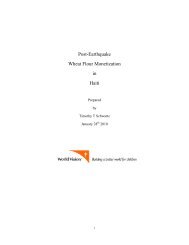Post Earthquake Jacmel (Haiti) Report and EMMA
You also want an ePaper? Increase the reach of your titles
YUMPU automatically turns print PDFs into web optimized ePapers that Google loves.
Schwartz 04/05/10 40<br />
8.7. Long term recommendations<br />
If we have learned anything over the past 50 years of development in <strong>Haiti</strong> it is that foreign<br />
intervention agencies are poorly suited to provide efficient long-term development. Moreover the<br />
development process in <strong>Haiti</strong> must increasingly involve the people it is meant to help, but not as<br />
passengers in schemes drawn up by foreigner experts--most of whom have little long term<br />
interest in <strong>Haiti</strong>. Aid recipients must be transformed into aid participants. This does not mean<br />
that NGOs should disappear. NGOs can provide the framework in which competitive, honest,<br />
<strong>and</strong> successful development programs are rewarded for success. The idea is that the process of<br />
economy-building occur not from the top down, as has so often <strong>and</strong> disappointedly been tried in<br />
the past; but from the bottom up. Suppliers, contractors, <strong>and</strong> consultants must increasingly be<br />
drawn from the local population or from that pool of expatriates who have long-term vested<br />
interest in the country. This point should become clearer in the following recommendations. xxxiv<br />
1. Control price fluctuations in the agricultural market <strong>and</strong> stimulate production.<br />
If development organizations are serious about improving agricultural output they should<br />
stop undermining the local market with foreign produce <strong>and</strong> instead buy <strong>Haiti</strong>an surpluses,<br />
use them in nutritional supplement programs for mothers <strong>and</strong> children as well as store them<br />
for redistribution in lean seasons. In association with purchasing local produce, organizations<br />
should establish programs for storing grains <strong>and</strong> beans. Fruits should be preserved through<br />
drying, canning <strong>and</strong> making of jellies. Meat can be dried <strong>and</strong> canned. Innovative storage<br />
techniques should be sought for otherwise un-storable but high surplus foods like sweet<br />
potatoes <strong>and</strong> manioc—e.g. grating <strong>and</strong> drying. At some point local government—meaning at<br />
the district level--should be encouraged to take over the task of food security <strong>and</strong> price<br />
supports. Or better still, the organizations that take on these tasks could be spun off as<br />
government agencies for the <strong>Haiti</strong>an State to take over administration from foreign<br />
development intervention agencies. Similarly,<br />
2. Provide access to credit for sound productive ventures that can yield profits <strong>and</strong><br />
stimulate the local economy. Example: the storage of grains, something that Diakonie <strong>and</strong><br />
ACDI/VOCA are involved in. Seasonal variations in the price of corn reach as high as 300<br />
percent. With access to capital <strong>and</strong> the appropriate drying <strong>and</strong> storage technology<br />
entrepreneurs can readily take on the costs of the industry. NGOs can assure profits by<br />
entering into purchasing contracts with the goal of using the food in MCNH (Mother Child<br />
Nutritional Health) programs.<br />
3. Help farmers <strong>and</strong> entrepreneurs gain access to both local <strong>and</strong> foreign markets <strong>and</strong><br />
eliminate competition with supplemented foreign produce by forbidding its importation<br />
or allowing for the imposition of tariffs. IICA, an OAS funded NGO sponsored a project<br />
that bought coffee from small <strong>Haiti</strong>an producers <strong>and</strong> used a private coffee broker to market<br />
the finished product in developed countries as gourmet ‗<strong>Haiti</strong>an Blue.‘ The project was<br />
profitable to all parties involved, exporting some 180,000 pounds of coffee in three years<br />
while paying small farmers 30% more than they could earn domestically. NGOs that conduct<br />
such projects could recoup their investments <strong>and</strong> then spin the projects off as private<br />
enterprises.<br />
Particularly promising is organic produce. <strong>Haiti</strong> might be the most organic country on<br />
earth. Upwards of 95% of all <strong>Haiti</strong>an produce is organic as <strong>Haiti</strong>an farmers cannot afford
















